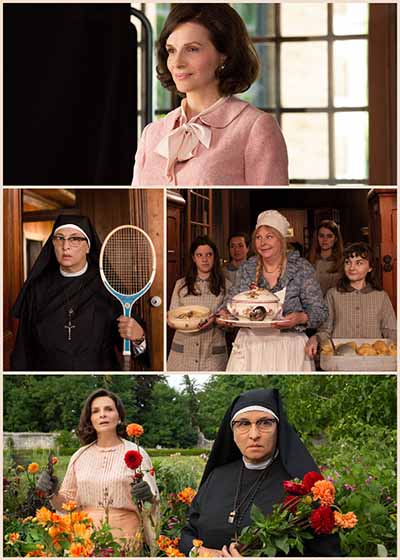 HOW TO BE A GOOD WIFE/ LA BONNE EPOUSE, France, 2020. Starring Juliet Binoche, Yolande Moreau, Noemie Lvovsky, Eduard Baer, François Berleand. Directed by Martin Provost. 109 minutes. Rated M (mature themes, sex and brief nudity).
HOW TO BE A GOOD WIFE/ LA BONNE EPOUSE, France, 2020. Starring Juliet Binoche, Yolande Moreau, Noemie Lvovsky, Eduard Baer, François Berleand. Directed by Martin Provost. 109 minutes. Rated M (mature themes, sex and brief nudity).
It isn’t always easy to be on the wavelength of the sense of humour of a particular culture. There is something about French culture and humour that is different from the rest of the world. And this may be the case with this ironically titled comedy-drama about what it was like to be a good wife in the past.
Actually, the past is not so long ago, a little more than 50 years for this scenario. The setting is a country town in the mountains of Alsace, remote from the revolutionary movements that were taking place; for example, students at the Sorbonne in Paris threatening the government of war hero, General Charles de Gaulle. The particular setting is a country town with a school for young ladies, 15 girls in their mid-teens, boarding in a dormitory, going to classes to learn the pillars of being a good wife, which are a recipe for being subservient to husband, overlooking all his weaknesses, being forgiving, totally at his disposal. They have classes on etiquette, on the precision of ironing husband’s shirts, and the practicalities of home and domestic life.
Younger audiences may be shocked at this portrait (heightened, we hope) which seems so alien and antiquated, at least to contemporary western ways. But, of course, that is the point.
There are three members of staff for the school. Juliette Binoche portrays Paulette, whose husband, Robert, founded the school (and who supervises with an ogling eye). Paulette is prim, proper, believes in what she is teaching. Then there is the husband’s sister, Gilberte (Yolande Moreau), getting older, fussy, awkward. And, there is a strange nun (no explanation of where she comes from or her religious order), Marie-Therese (Noemie Lvovsky), who was in the resistance during the war and has absorbed that kind of discipline. Prim but oddball goings-on.
Of course, there are the usual problems, especially from the 60s, sexual awakening, sexual orientation, permissiveness and the pill . . .
However, this is a film, of course, about Housewife Liberation. Paulette, on the death of her husband, discovers a new way of life with the banker whom she knew decades earlier. Life is not as prim as she believed. Then the school wins the competition (with a parody television show about the school and its success) and it is off to Paris as a prize.
But, the busload of girls and teachers is on its way to a Paris where the students are in revolt. Roadblocks and police. But this leads to a musical number and some odd choreography where Paulette leads the girls along the road to Paris, proclaiming their liberation. While we agree in principle, the story and treatment is a matter of taste.
Palace
Released 26 December
Peter Malone MSC is an associate Jesuit Media